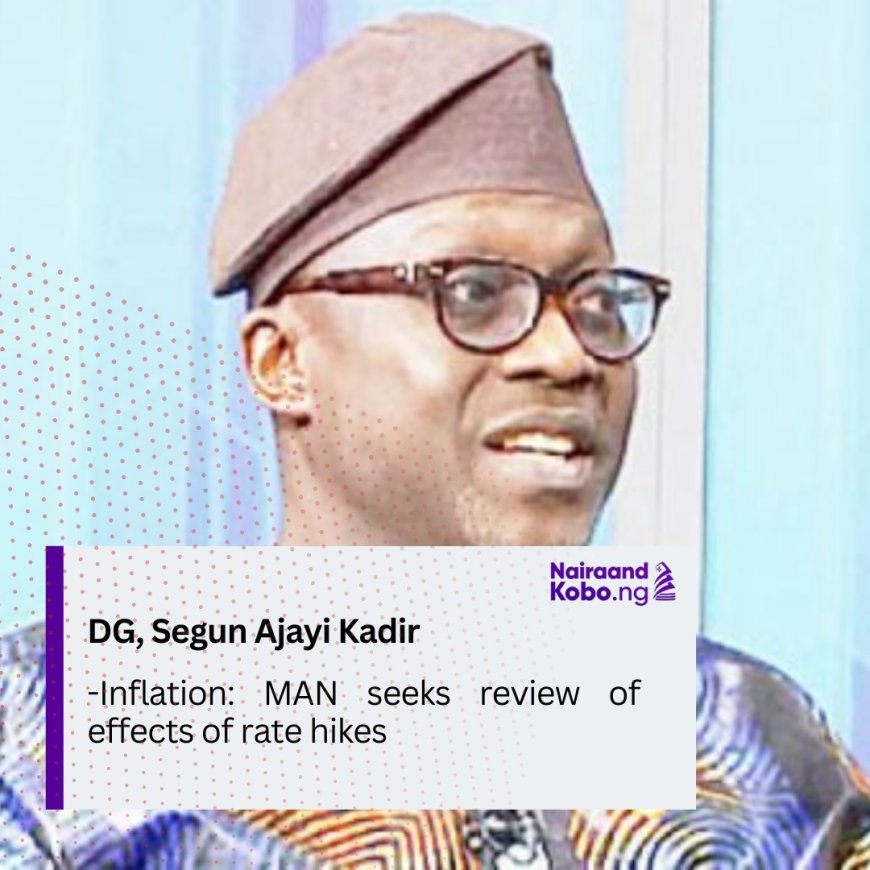Inflation: MAN seeks review of effects of rate hikes

The Manufacturers Association of Nigeria (MAN) has urged the Federal Government and the Central Bank of Nigeria (CBN) conduct a comprehensive review of the effects of continuous interest rate hikes on inflation and the real sector over the past five years.
MAN said in light of the recent decisions by CBN’s Monetary Policy Committee (MPC) to continuously increase interest, which now totals 15.75 percentage points since May 2022, a comprehensive review of the effects of such rate hikes on inflation and the real sector is necessary to guide future decisions.
MAN Director General Segun Ajayi-Kadir, in a statement on Tuesday, said the Association acknowledges the CBN’s efforts to stabilize the economy, but is however, surprised that the CBN is increasing the MPR against the backdrop of the meagre improvement in inflation figures, which could be largely traceable to the onset of the harvest season.
“We also note that this increase is coming at a time that Central Banks, in other climes, are either retaining or cutting rates,” he stated, adding that “It is, therefore, expedient that government adopt a holistic and balanced approach to policy formulation and decisions, with due consideration of their overall impact on the various sectors of the economy, particularly the productive sector.”
Ajayi-Kadir said undoubtedly, price stability is crucial, and so is the survival and growth of the manufacturing sector. “This should be top priority at this time and is in line with the government’s avowed commitment to growing domestic production, creating more jobs and alleviating poverty,” he emphasised.MAN also urged the Federal Government and the CBN to focus on promoting domestic production and economic recovery by allowing time for previous rate increases to take effect before implementing further hikes.
The association also stressed the need to strengthen the collaboration between the monetary and fiscal authorities to ensure that they are aligned to support growth, including introducing fiscal measures that support the importation of essential raw materials and technology at concessionary rates to ease the burden on manufacturers.
Ajayi-Kadir also called on government to accelerate the disbursement of the N1trillion single-digit loan in the accelerated stabilization and advancement plan for the manufacturing sector to cushion the impact of the high MPR on borrowing costs.
He said the decision to raise the MPR to 27.25 per cent has far-reaching implications for the manufacturing sector, as it compound the challenges faced by the sector, including rising production costs in the face of declining consumer purchasing power.
“With the increase in borrowing costs, manufacturers will now pay over 35 per cent on their credit facilities. Clearly, this will lead to increase in production costs. higher prices of finished goods, lower competitiveness and production capacity expansion,” Ajayi-Kadir said.
According to him, the impact of higher interest rates goes beyond compounding manufacturers’ challenges, noting that it stifles opportunities for investment in crucial areas such as technology, retooling, and expansion within the manufacturing sector.
He added that manufacturers will, all the more, be compelled to choose servicing existing credit facilities over expansion and investment in new product lines.
“For instance, over the first six months of the year, manufacturers incurred more than ₦730 billion in capital expenses due to the continuous rise in interest rates imposed by commercial banks.
“This dilemma hampers innovation, productivity and growth. Moreover, the manufacturing sector is grappling with depressed consumer demand, primarily driven by lower purchasing power. This decline has severely hampered capacity utilization within the sector,” Ajayi-Kadir said.
He stated that data from the first half of the economic review published by MAN reveals a troubling trend, with the value of unsold finished goods inventory surging by 42.93 percentage points, to reach ₦1.24 trillion compared to ₦869.37 billion at the close of 2023.
“This growing stockpile of unsold products underscores the difficulties manufacturers face in a weakening market. The broader implications of these challenges threaten not only the manufacturing sector but also the Nigerian economy as a whole,” the MAN DG said.
He said higher borrowing costs lead to poor access to funds, lower capacities and potential business closures. “The capacity to absorb the country’s growing youth population into meaningful employment has diminished significantly with the attendant adverse socioeconomic and security implications.
“In broad terms, MAN is worried about the implications of the continuous rate hikes on the productive sector and earnestly expects the CBN to stop the rate hike but explore more of the monetary-fiscal policy handshake option to curb inflation,” he concluded.
Inflation: MAN seeks review of effects of rate hikes - The Nation Newspaper (thenationonlineng.net)









